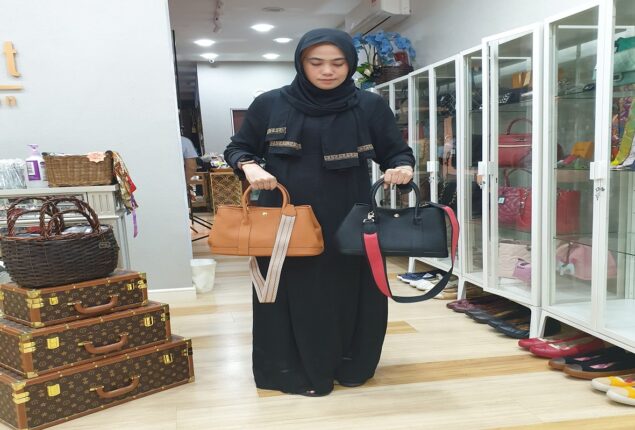PM offers Indonesian President relief support after deadly earthquake
ISLAMABAD: Prime Minister Shehbaz Sharif on Monday offered condolence to the Indonesian...

Indonesian TikTok merchants sell hijab, handbags
Inggit Pambudi and his wife Mudya Ayu sell headscarves in their hamlet.
The pair is one of the hundreds of home businesses in Cicalengka, West Java, known as “Kampung Hijab”
Cicalengka specializes in modest clothing, which is popular in Indonesia.
Pambudi and his wife rely on a sophisticated marketing technique to sell Cicalengka’s products. As Hijab muddy on TikTok, the couple sells items 24/7.
Pambudi, 25, said Al Jazeera, “We have no store.” I thought it was a nice chance when I realized I could broadcast and sell things on TikTok.
Indonesia, the world’s fourth-most populated country, loves TikTok. The Chinese social media company recorded 106.9 million adult users in Indonesia in July, making it its second-biggest market behind the U.S.
TikTok, a music video-combined-social-network, entered Indonesia in 2017. After authorities momentarily banned the app for obscene and blasphemous content, it began storming the country’s rich e-commerce industry in 2021.
During Ramadan, many Muslims stay up late to eat their last meal before fasting.
TikTok contacted Pambudi last Ramadan.
“TikTok’s’relationship manager’ contacted me. Pambudi remarked, “He told me I could do live shopping.”
Pambudi sold 1,000 headscarves per month. He’d shopped online before. Since 2018, he’s been testing online platforms to sell Hijab muddy items, which cost half a cent to $3 each.
Live shopping was new.
“The relationship manager taught us live streaming.” How to employ features, choose backgrounds, lighting, equipment, and what to say to clients, stated Pambudi. “Training took five months.”
Pambudi and Ayu began livestreaming every morning and afternoon.
However, nocturnal streaming increased sales.
After 8 pm, we went live. People have returned home after work, prayed Isha, and are normally scrolling on their phones, Pambudi said.
Good sales. Buyers appeared. Initially, we ended at 11 pm. The response was great when we continued until Fajr (morning prayer).
Pambudi said early am is prime time, with hundreds of watchers. Thousands watch National Online Shopping Day.
Pambudi sells 30,000 headscarves a month, a 30-fold increase from before live streaming.
He now has 10 hosts providing live streams. Three eight-hour shifts a day.
Indonesians love live shopping.
Ipsos surveyed Indonesian customers and found that 71% had attended live shopping events, with 56% making purchases.
The trend could open doors to new clients for Indonesia’s 65 million small and medium-sized businesses (SMBs), 98 percent of which are micro-enterprises with less than $300 million in Indonesia rupiahs ($19,500) in annual sales.
About 21 million Indonesian SMBs, or 32% of the total, sell their items online, according to Indonesia’s Ministry of Communication and Information Technology.
The government wants 30 million SMBs online by 2024.
“Digital onboarding remains a hurdle for Indonesian SMBs,” Pangerapan told Al Jazeera.
“We must map digital technology needs and provide the proper training and facilities to drive digital adoption.” This comprises mentors, training courses, toolkits, and tools for Indonesian SMBs.
TikTok expects its ventures into e-commerce would boost Indonesia’s digital revolution.
Esme Lean, head of Small and Medium Businesses at TikTok APAC, told Al Jazeera that more Indonesian SMBs are joining the app and using its commerce tools to advertise their businesses.
TikTok’s “shoppertainment” approach “levels the playing field, even when content development and live sessions aren’t SMB’s core capabilities,” Lean added.
“Keep eye contact. Oktaviana told Al Jazeera that even while you’re talking to the camera, your eyes shouldn’t wander.
“You can make jokes during the Livestream, but you must also know what you’re selling to answer viewers’ inquiries.”
Oktaviana, like Pambudi, goes live on TikTok daily.
She owns Oktaviana Tas Grosir, a handbag wholesaler. Since she started livestreaming last year, her 2013 company has expanded.
Oktaviana’s sales have risen 50% after she began live sessions. This motivates her to stream up to 20 hours every day.
The 29-year-old entrepreneur has 10 livestreaming hosts.
We can now sell 120,000 bags per month and have 25 garment workshops to fulfill monthly requests.
Oktaviana’s business growth depends on livestreaming, thus she focuses on enhancing her digital operations.
This isn’t easy.
“Internet speed is a recurring concern.” Oktaviana has moved providers three times since no local service meets her demands.
Mojokerto’s rainy season makes things worse. Regular power outages disrupt our work. With all these technical issues, we can only do so much to develop our business.
Catch all the Business News, Breaking News Event and Latest News Updates on The BOL News
Download The BOL News App to get the Daily News Update & Follow us on Google News.